 So I was wrong about being done with the Puppies posts, because I just had the surprising pleasure of watching Brad Torgersen, self-avowed conservative, go Full Post-Modern. Pics included to show I’m not making this up.
So I was wrong about being done with the Puppies posts, because I just had the surprising pleasure of watching Brad Torgersen, self-avowed conservative, go Full Post-Modern. Pics included to show I’m not making this up.
“Gents, thing is, there is *no* objective standard. None. Pretense to the contrary, is just that: pretense.
…
Again, no objective standard. Just taste. If people with taste similar to yours can vote in sufficient numbers, then your taste prevails. If those with a different taste can vote in sufficient numbers, your taste does not prevail.”
“Storytelling has no standards.
The story either resonates with many, or it resonates with few.”
(in response to “Any writer should be able to judge a work’s quality based on professional criteria. Even if it’s not to your taste, you should have the ability to tell if it was well written or not. This is a vital skill for us. How do you get through critiques without it? How did you learn your trade without it?“)
“Folks, really, taste is not objective. There is no objective standard at work here. Just the competition of tastes.”
(in response to “Taste is subjective. Professional quality is objective. I will certainly agree that there are degrees of quality, but to say that ‘there are no standards’ is nonsense.“)
“Actually, no, “professional quality” is not objective either. … There are no boxes to check. No owner’s manual. There is only resonance. And resonance cannot be qualified nor quantified.”
(in response to “Why be a writer if you don’t think it’s a craft worth mastering? If you don’t think that a story can be honed and made better? People can argue about art and which story is “better” than another in the artistic sense all they like (and argue in good faith, I think), but the craft of writing is without question something that we can assess, and find wanting.“)
“Quality is in the eye of the beholder … in the end, there is nothing objective about it. … Nobody gets away from it. Because there is no objective measurement. Just audience and reader satisfaction.”
(in response to “So Brad, your writing isn’t any better now than it was when you were writing for years and years and selling nothing?“)
“you’d have to ask my readers. I freely admit to having no grasp of my own quality, now vs. when I broke into print in 2010 … Am I “better” than in 1992? Well, sales are sales…”
Now, I don’t want to say Brad doesn’t have any point at all, certainly much of art appreciation is subjective. But to see him go full “There are no standards, there is only resonance!” is delightful.
In retrospect, I guess it was kinda inevitable.
I expect that for Sad Puppies 4, Brad will give us an address to which we can send anything we had published in the previous year, and he will then pick five works at random to go on the slate, since everything is equally good and it’s all just subjective taste. We’ll re-name the Hugos “The Rando’s” and enjoy it as the biggest piece of Post Modern Performance Art of this decade. It’ll be like we’re all in the 90s again! :)
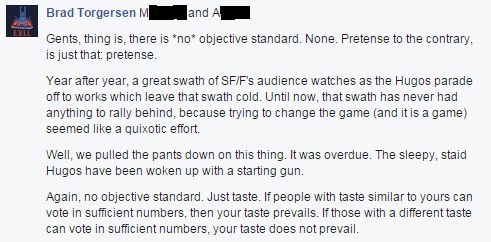

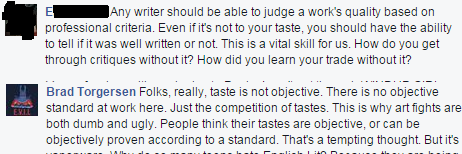
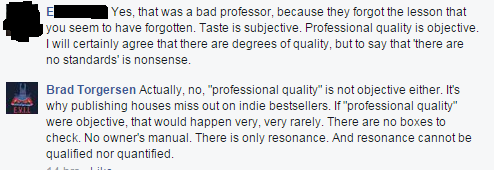
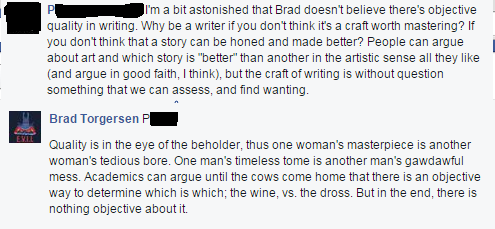
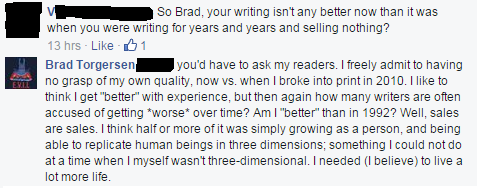
Hey, if you know an objective way to measure quality in fiction, I’m all ears. Lay it on me. I’ll write up an algorithm and make zillions computer generating deathless prose.
Funny how that’s never happened yet though. You’d think somebody would have done that by now.
What I do know is that anything by Catherynne Valente is far better than anything T.L. Knighton is capable of writing.
Actually, there are lots of ways of evaluating fiction. The thing is, there isn’t just one kind of story, nor is there just one way to write a particular type of story successfully, so it’s not a matter of just writing up an algorithm to write stories for you. Innovation is important in good fiction, as are the basic craft aspects of fiction writing. But if you’re seriously thinking that none of this can be evaluated, here’s a starting place for evaluating fiction:
http://writinginthedarktw.blogspot.com/2014/01/fiction-writing-assessment-form.html
The assessment form assumes you’ve been studying fiction and literature for a while and know what good description and good characterization look like. Again, these are complex topics and a wide variety of articles and books have been written on these subjects.
Dude, this isn’t “post-modern”. De gustibus non est disputandum and all that.
My prefered phrasing of that is “Your kink is not my kink” :) It’s true, but post-modernism (as I understand it) takes that to an extreme and says there are *no* truths, only interpretations. Reading Brad’s words again, it sounds very much like he’s endorsing the latter rather than the former.
Firstly, ditto to MugaSofer, who took the Latin right out of my mouth.
Secondly, based on your previous “objective criteria” post, I think McNamara’s Fallacy is at work. You’re not measuring what’s important, you’re making important what’s easy to measure. Of the objective criteria you mentioned previously, Structure, Word crafting and Theme, I consider the first two to be a tiny part of what makes a story good, and theme is a matter of personal preference, because themes that resonate with one person may not resonate with another.
If you want, you can post your objective criteria, and we’ll see how the greatest work in fantasy (and probably Humanity’s greatest piece of art, period) stands up to it.
Someone asked me what made that story in particular good, and that was my answer. I’m not saying that’s the only measurement, or even that it’s an objective measurement. But I am saying that you can compare works to a degree. And that anyone who says “There are no standards” is wrong.
>even that it’s an objective measurement
Well, you did claim that “This is simply, objectively, a very good piece of work.”
> And that anyone who says “There are no standards” is wrong.
There’s a difference between saying “There are no standards” and “there are no objective standards”. Brad appears to be arguing for the latter, and you seem to be arguing against the former. Note that the latter statement is compatible with “Beauty is in the eye of the beholder” and the former isn’t.
>But I am saying that you can compare works to a degree
Agreed, but we each compare works using our own personal aesthetics, not a disembodied objective aesthetic. We can then use the results to compare our personal aesthetics.
You didn’t need to hide my names in those comments above. I’m glad you wrote this as it saves me from doing so. Brad’s whole notion that there are no standards at all, such that he couldn’t even judge his own ability as a writer came off as so bizarre to me that I haven’t been able to let it rest, but hadn’t managed to finish my write-up on it, so I’ll leave it.
Liberal bias? Probably. It is subjective which work is The Best? Absolutely. Nerds in large groups can be terrible people and treat an outsider as less than human? Don’t deny it. You know we do.
All of which is a distraction from: You don’t get to blow up the Hugo Awards because you are butthurt about… Well, pretty much anything.
“But Brad, it was a dick move” is a complete and sufficient rebuttal.
I’ll stick up for Brad’s side on this one. No, there aren’t objective standards. Whatever works, works; and later people go off and make a rule.
There are standards… but they’re not objective. Pretty much any rule you can name, can be broken; and, when done well, the result can be brilliant.
Ah, you say– but I put in that caveat, you have to break the rules for a reason. Yep.
But people don’t know the reason until they see you do it.
…
Beerwulf wrote:
Say, I like that one.